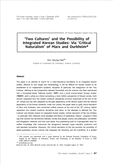

PARTNER
검증된 파트너 제휴사 자료
‘Two Cultures’ and the Possibility of Integrated Korean Studies: Via ‘Critical Naturalism’ of Marx and Durkheim*
24 페이지
최초등록일 2016.10.11
최종저작일
2016.09

-
 * 본 문서는 배포용으로 복사 및 편집이 불가합니다.
* 본 문서는 배포용으로 복사 및 편집이 불가합니다.
미리보기
서지정보
· 발행기관 : 건국대학교 통일인문학연구단
· 수록지 정보 : 통일인문학 / 2권 / 2호
· 저자명 : Kim Myung-Hee
영어초록
This paper is an attempt to search for a meta-theoretical foundation to an integrated Korean studies. Without its own target and methodology, it will be difficult for Korean studies to be established as an independent academic discipline. In particular, the antagonism of the ‘Two Cultures,’ referring to the juxtaposition between humanities and the sciences, has been reproduced into a humanities-based ‘National studies’ (‘國學’) and a social science-based ‘Korean studies’ (‘韓國學’), and is acting as a factor preventing a more holistic perspective of Korean society. Such division originated from the modern academic disciplinary structure systemized at the end of the 19th century but was then deepened by the path dependency of the division system and the external dependency of the Korean academia. Under this context, this paper seeks to graft critical naturalism of Marx and Durkheim, who envisioned unified sciences at the end of the 19th century, before separation into modern academic disciplines took place, to the attempts to alleviate the ‘Two Cultures’ and thereby project an integrated Korean studies. Critical naturalism of the two thinkers – in particular, their relational social paradigm and theory of explanatory critique – proposes a third way that resolves the dichotomies between society and people, science and philosophy, nomothetic and idiographic methods, and facts and values, thus positioning itself as a paradigmatic basis for unified knowledge that overcomes the antagonism between hyper-naturalist positivism and anti-naturalist humanities. Moreover, the critical naturalism of the two provides the possibility of depth-explanatory human sciences that integrates the historicity and the scientificity of a divided society as well as abundant philosophy of science resources to promote a more complete Korean studies that encompasses both the South and the North.참고자료
· 없음태그
-
자료후기
Ai 리뷰지식판매자가 등록한 자료는 매우 유익하고, 주제가 잘 정리되어 있어 학습에 큰 도움이 됩니다. 특히 자료의 품질이 높고, 내용이 풍부하여 많은 정보를 얻을 수 있었습니다. 앞으로도 이러한 유익한 자료가 계속 등록되기를 기대합니다! -
자주묻는질문의 답변을 확인해 주세요

꼭 알아주세요
-
본 학술논문은 (주)코리아스칼라와 각 학회간에 저작권계약이 체결된 것으로 AgentSoft가 제공 하고 있습니다.
본 저작물을 불법적으로 이용시는 법적인 제재가 가해질 수 있습니다. -
해피캠퍼스는 구매자와 판매자 모두가 만족하는 서비스가 되도록 노력하고 있으며, 아래의 4가지 자료환불 조건을 꼭 확인해주시기 바랍니다.
파일오류 중복자료 저작권 없음 설명과 실제 내용 불일치 파일의 다운로드가 제대로 되지 않거나 파일형식에 맞는 프로그램으로 정상 작동하지 않는 경우 다른 자료와 70% 이상 내용이 일치하는 경우 (중복임을 확인할 수 있는 근거 필요함) 인터넷의 다른 사이트, 연구기관, 학교, 서적 등의 자료를 도용한 경우 자료의 설명과 실제 자료의 내용이 일치하지 않는 경우
“통일인문학”의 다른 논문도 확인해 보세요!
-
The Three Ecologies for True Ecology 7 페이지
-
Inquiring of Park Yu-ha, the Counsel of the Empire 7 페이지
-
Russia’s Vision of Re-unified Korea’s Place in the Northeast Asian Sec.. 11 페이지
-
Study on the Development of Healing Programs for North Korean Refugees.. 30 페이지
-
The Possibility of Literary Communication through Comparison of South .. 18 페이지
문서 초안을 생성해주는 EasyAI
